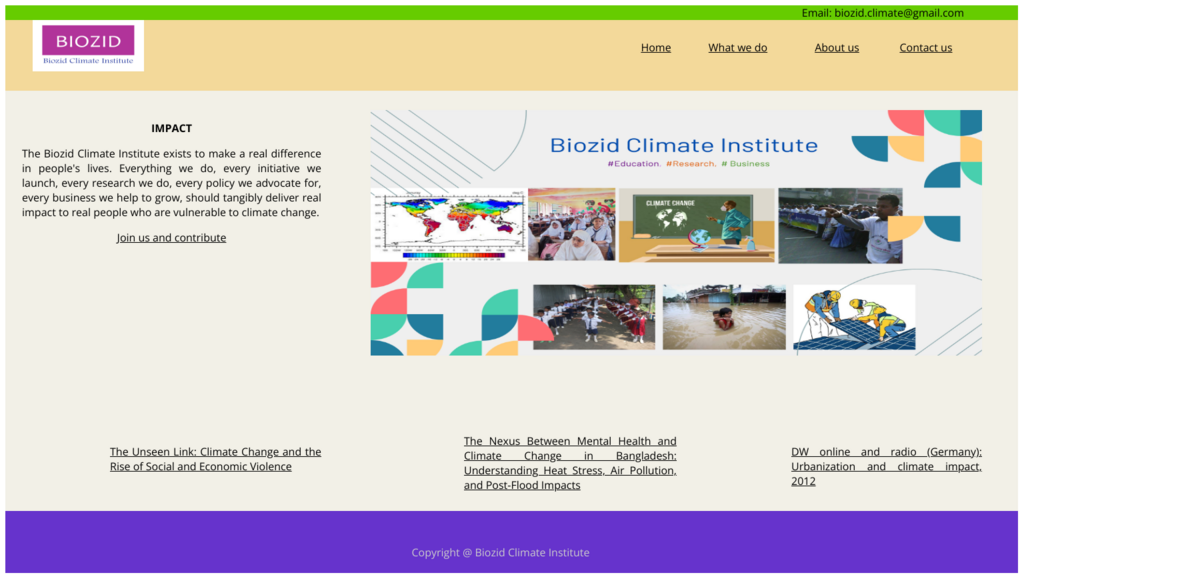What the Biozid Climate Institute Projects Are All About
The Biozid Climate Institute (BCI) exists to make a real difference in people’s lives. Every initiative, every piece of research, every policy advocacy, and every business support they provide aims to deliver tangible impact to those vulnerable to climate change. Based in Bangladesh, BCI promotes projects centered on climate education, research, and green business development. They offer climate science education accessible to everyone, crafting high-quality materials and tailored courses for vulnerable communities. For the little ones, there’s the Climate Vocabulary and Cartoon Course—using fun cartoons and storytelling to make environmental concepts easy and engaging. These programs inspire young minds to become environmental stewards, ready to take action and build a sustainable future.
Main Benefits of Biozid Climate Institute’s Educational Programs
Here’s a quick snapshot of what BCI’s education initiatives bring to the table:
- Certified Climate Adaptation Course for Youth, covering eco-friendly practices, green jobs, and sustainability.
- Engagement of youth through public events like the National Consultation Workshop on Youth Engagement in Climate Change, which gathered 120 participants in Dhaka.
- Development of climate-related courses tailored specifically for vulnerable communities, ensuring inclusivity.
- Promotion of environmental awareness and green careers among young people.
- High-quality educational materials designed to be accessible and engaging for all ages.
Fostering Regional Collaboration Through Knowledge Sharing
BCI doesn’t just work locally—they’re active partners in regional initiatives too. For example, civil society representatives from across Asia-Pacific gathered in Colombo, Sri Lanka, for the Asia-Pacific ARA-TLS Knowledge Synthesis Symposium in February 2025. Organized by Transition Research and the Adaptation Research Alliance (ARA), this event was a platform for climate adaptation experts to exchange experiences, develop evaluation tools, and strategize on scaling up climate adaptation efforts. BCI’s involvement highlights their commitment to fostering collaboration and knowledge-sharing beyond Bangladesh’s borders.
Strengthening Community-Based Early Warning Systems
In May 2025, a two-day National Workshop on Localized Early Warning Mechanisms took place in Dhaka, bringing together a diverse group of stakeholders—from civil society and government officials to disaster risk experts. Organized by Nari Maitree and the Global Network of Civil Society Organizations for Disaster Reduction (GNDR), with BCI as a partner, the workshop focused on enhancing community-based Early Warning Systems (EWS). The goal? To make these systems more accessible, effective, and locally owned, so vulnerable communities can better prepare for climate-induced hazards. The Executive Director of BCI shared insights on the Decentralized Biozid Climate Disaster Early Warning System, sparking inclusive dialogue and practical solutions.
Driving Research and Supporting Green Entrepreneurship
Understanding climate change deeply is key, and BCI conducts research to uncover causes, impacts, and knowledge gaps in climate science. But research is just one piece of the puzzle. BCI also supports ecopreneurship by helping entrepreneurs establish and grow green businesses. One standout project offers renewable rooftop solar energy entrepreneurship training specifically for women and youth in Khulna. Beyond training, the project builds capacity among local government officers, engineers, and electricians. This initiative empowers participants to overcome climate-related economic and social challenges while contributing to the energy transition in their communities.
Project Impact on Sustainable Development Goals (SDGs)
- SDG 4: Quality Education – through climate science education and tailored courses.
- SDG 7: Affordable and Clean Energy – via renewable energy entrepreneurship training.
- SDG 11: Sustainable Cities and Communities – by strengthening community-based Early Warning Systems.
- SDG 13: Climate Action – through research, advocacy, and adaptation initiatives.
- SDG 17: Partnerships for the Goals – demonstrated by regional collaboration and multi-stakeholder workshops.
About the Biozid Climate Institute
Biozid Climate Institute, or BCI, is an autonomous sister concern of the Shorab Ali Dewan Cultural Society. It’s a multidisciplinary, non-profit organization registered with the Government of Bangladesh and accredited by the United Nations ECOSOC. With a devoted and committed workforce, BCI has expanded its operations across diverse social development areas—including climate change, renewable energy, green economy, nuclear safety, youth development, agriculture, disaster management, migration, environment, education, health, and advocacy for basic services. Their rich experience and broad scope make them a key player in Bangladesh’s social and environmental development landscape.


















